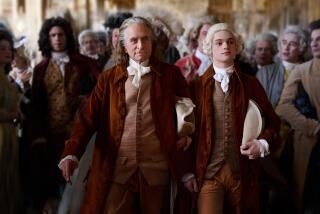BOOK REVIEW / FICTION : Fictional Jefferson Not Up to Real One : JEFFERSON: A Novel, <i> by Max Byrd</i> , Bantam Books $22.95, 424 pages
- Share via
The ostensible author of this novel is William Short, Thomas Jefferson’s secretary and general assistant during the statesman’s tenure as America’s ambassador to France.
We’re to assume that Short is writing a memoir of the years from 1785 to 1789, just before the tumbrels began to roll through the boulevards of Paris, carrying the condemned to their deaths by guillotine. Although Paris was deceptively quiet in the years preceding the Revolution, the omens were obvious, and Jefferson was acutely sensitive to the signs around him.
According to his devoted but often ambivalent amanuensis, impending revolution was only one of his employer’s concerns. For a man with Francophile leanings--who would teach his servants French, stock his cellars with imported wines and serve his guests the delicacies he’d learned to enjoy while in France--Jefferson seems to have been surprisingly restless while in the country he so admired.
His health was poor for virtually his entire four-year sojourn, and his misery was compounded by loneliness for his beloved Virginia. Jefferson also seems to have suffered from a discomfiting awareness that Paris had already been captivated by Benjamin Franklin.
Young William Short, so impressed by Jefferson’s intellect, frequently mentions his mentor’s habit of folding his arms tightly across his chest, hands clasped, as if to preclude any physical contact with another person: “instinctive fence-building for a shy and reserved man.”
Jefferson’s French architect Clerisseau disagreed, analyzing the gesture as that of “a cold man locking something in,” a view shared by many of the architect’s compatriots.
In a further attempt to capture Jefferson’s enigmatic character, Short refers to his continual singing “in that soft, reedy voice that made him such a bad public speaker,” and in the same breath mentions his decidedly peculiar habit of wiping off a horse’s back with a fresh white handkerchief before mounting, then whipping the horse until “the flesh bled in buckets.”
Leaning backward to show his impartiality, Short then has Clerisseau ask “with an ugly grin” if the great democrat whipped his slaves in the same way.
Having offered these unflattering insights, Short settles back into his adulatory mode, chronicling Jefferson’s largely uneventful term as ambassador, marked by meetings with statesmen who seem to have consulted him about the logistics of revolution without paying attention to his advice.
All things considered, politics plays a relatively small part in this story, which concentrates on the reluctant ambassador’s daily life. To enliven a bland account, Short allows Jefferson a rather tepid romance with Maria Cosway, the vivacious wife of a well-known English painter of miniatures.
After a few walks in the park, a luncheon or two, and the exchange of some discreet letters, Jefferson abruptly ends the attachment that has scarcely begun, thereby showing himself closer in spirit to a New England Puritan than to the Virginia cavalier he might have been.
Because the lines between fact and fiction are never precisely drawn, the reader is left to wonder if Jefferson did in fact enjoy a bit of dalliance with Maria Cosway, who was, like most of the characters, an actual person. Considering how unhappy he seems to have been in Paris and how little he accomplished, one rather hopes he did.
Usually a historical novel heightens and embellishes the truth, but the author of “Jefferson” seems to have done precisely the opposite, turning one of the most remarkable figures in American history into a distant, wintry personality, leaving many of the fascinating paradoxes of Jefferson’s character largely unexplored.
Although we’re given a few glimpses of Jefferson’s life before and after his Parisian adventure, these vignettes only serve to make the French years pale by contrast. If this is an accurate version, one can hardly wonder at his eagerness to return to Virginia.
More to Read
Sign up for our Book Club newsletter
Get the latest news, events and more from the Los Angeles Times Book Club, and help us get L.A. reading and talking.
You may occasionally receive promotional content from the Los Angeles Times.









